Politics
STA, 5 April 2019 - The weekly Mladina revealed that the Hungarian embassy had protested with the Foreign Ministry asking it to intervene over a Mladina cover portraying Hungarian PM Viktor Orbán as a Nazi. The news prompted condemnation from journalists and a joint session of the parliamentary culture and foreign policy committees is to be held to discuss the issue.
The ministry confirmed it had received a verbal diplomatic note from the embassy protesting a "politically irresponsible cover of Mladina" from 22 March and asking the ministry for "assistance in preventing similar incidents in the future".
The cover shows cartoons of the Slovenian Democrats (SDS) head Janez Janša, SDS deputy Branko Grims and SDS MEP Milan Zver snuggling with the towering Orban, who performs the Nazi salute in front of a Hungarian flag with the Slovenian coat of arms.
The note says that the "cover violates the principles of freedom of the press and expression and that the acts such as the publication of the cover harm the otherwise excellent bilateral cooperation of our countries".
The ministry answered by saying it "consistently respects the principle of freedom of the press and expression and that it neither encroaches upon editorial policy of the Slovenian media, nor assesses it."
The weekly said that the note followed a letter sent to Mladina by Ambassador Edit Szilágyiné Bátorfi, in which she said that Mladina did not strive for friendship between the two nations and that its articles did not reflect facts.
Also writing about the cover this week was Orbán's spokesman Zoltán Kovács, who said he was "not surprised by the historically confused and unprofessional stance of Mladina", which he labelled the "former mouthpiece of the Communist Party".
The weekly attributes Hungary's reaction to the cartoon going viral last week in the public, with "almost all of the remaining independent Hungarian media reporting on it".
The embassy's note was condemned by the Slovenian Journalist Association (DNS), which said the embassy wanted the ministry to "encroach upon the editorial autonomy of a media outlet", and that it was "proof of the seriousness of the situation in the so-called democratic Europe."
The association said that the embassy's comments were not only completely unacceptable, but also an "unheard-of expression of a conception of complete control and disciplining of the media by the authorities".
"At the same time, the note is another concrete example of how the government of an officially democratic country, a member of the EU and NATO, perceives the role of the media in society," the DNS added.
A joint session of the parliamentary culture and foreign policy committees is to be held to discuss the note.
The session was requested by coalition Modern Centre Party (SMC) deputy Gregor Perič, who welcomed the "determined response by the ministry", labelling the Hungarian embassy's request as "completely unacceptable".
"It points to a huge departure of the Hungarian authorities from freedom of the press as it is generally understood by the majority in the joint European family," added the member of the EU Affairs Committee.
The chair of the Foreign Policy Committee, Matjaž Nemec of the coalition Social Democrats (SD), welcomed the initiative and said he expected the joint session to be called within the shortest possible time.
"Such inadmissible (non-)diplomatic pressure should be opposed in the most determined manner possible," Nemec said, adding that freedom of the press was one of the fundamental values of Slovenian society.
The chair of the parliamentary Culture Committee, Violeta Tomić of the Left, also supports the idea of the joint session. She said that in Hungary critical and free media had virtually disappeared under Orbán.
Mladina said that many tenured diplomats said they had never seen such a note. Roman Kirn, the former foreign policy advisor to the prime minister, said "such notes are unusual for countries where freedom of the press is respected."
The weekly said Hungary's influence on Slovenian politics was not negligible. "The largest Slovenian parliamentary party, the SDS, is today the biggest debtor to Orban, whose regime controls a part of internal affairs in Slovenia."
"We had the opportunity to learn this during the debate within the European People's Party (EPP) on the expulsion of Orban's Fidesz from the group: the Slovenian representatives defended him the most," added Mladina, which also dedicated today's editorial to the issue.
In the commentary, editor-in-chief Grega Repovž said the protest note was "not very diplomatic, but unusually sharp," and added that the response from the ministry was a response "of a serious country - cold and not allowing any debate."
Referring to Hungary, Repovž said that the entire Europe was dealing with "a country which dares to demand from another country's government to act against journalists", labelling it a serious security threat to the entire region.
He went on to say that Hungary was a "country which does not hide that it tries to encroach upon the autonomy of the Slovenian state with capital and all other ways."
All our stories about Hungary and Slovenia are here, while all those about Mladina are here
STA, 4 April 2019 - Prime Minister Marjan Šarec expressed concern on Thursday over the news that the Croatian Intelligence Agency (SOA) was behind the wire-tapping of Slovenia's arbitrator and agent in the border arbitration. "If this is the modus operandi in the EU we are concerned," the PM said after today's government session.
Šarec said the head of the Slovenian national intelligence agency SOVA had presented the situation in this case and in the Balkans to cabinet members behind closed doors today.
"I will not go into detail because these are matters of the system of national security and the intelligence agency and it is not wise to talk too much," he said, adding though that what they had heard was worrying.
"On the one hand we are happy because the intelligence agency is doing a good job, but on the other we are concerned if this is the modus operandi within the EU and if this is how countries which are supposed to be friendly treat each other."
News portal 24ur.com reported on Wednesday that the SOA was the one who wire tapped the phone calls between Jernej Sekolec and agent Simona Drenik, who were not allowed to communicate with each other, in July 2015.
After the recordings of the conversations were leaked, Croatia declared the process irrevocably tainted.
Even though Sekolec and Drenik resigned and the tribunal decided the breach was not so grave as to derail the process, Croatia declared it would not accept the arbitration award.
So far it had been speculated that German or US intelligence services were behind the wire-tapping.
The prime minister stressed that the arbitration process was now concluded and that solving the border issue through arbitration had been a condition for Slovenia's support to Croatia's EU membership.
"This is why what we heard today did not give us optimism regarding our neighbourly relations," he said, adding that Slovenia would continue to act in the European spirit.
The Croatian side rejected today any involvement of its intelligence services, with Foreign Ministry State Secretary for European Affairs Andreja Metelko Zgombić telling the press she did "not know where the Slovenian prime minister got such information from".
She said Croatia had not been able to determine how the story about the collusion on the Slovenian side had arrived to Croatia media.
Meanwhile, Slovenian Defence Minister Karl Erjavec, who was foreign minister at the time of the wire-tapping scandal, told the press today he was happy that it was finally clear who had conducted the wire-tapping.
"Obviously this was the job of Croatian secret services for a reason, because the Croatian leadership obviously thought the arbitration award would not be favourable for Croatia, that Slovenia will be given free access to high seas and more than half of the Piran Bay. Obviously they wanted to discredit the procedure," he said.
He added that Croatia had also picked the perfect timing to release the recordings, when he was on a private trip abroad with his wife.
Erjavec refused to speculate whether the revelation that the SOA wire tapped the Slovenian officials would in any way help Slovenia's efforts for the implementation of the arbitration award.
The report on wiretapping to Sekolec and Drenik will be discussed by the parliamentary Intelligence Oversight Commission next Wednesday. The commission will also debate the situation in the Western Balkans and an increase in illegal migration.
Slovenia launched proceedings against Croatia over its non-implementation of the arbitration award before the EU's Court of Justice in the mid-March 2018. It argues that Croatia infringes EU law by refusing to implement the June 2017 award of the arbitration tribunal.
STA, 3 April 2019 - Education Minister Jernej Pikalo has announced that the coalition has come up with an agreement on the state funding of private primary schools, under which the mandatory state-approved curriculum would be fully funded, but the extended curriculum would not get any funds.
The announcement on Wednesday comes as the five-member minority coalition is trying to implement the Constitutional Court's ruling from 2014 mandating full state funding of private primary schools teaching state-approved curricula.
Currently, private primary schools have 85% of both their mandatory public curriculum and extended programme covered by the state. Extended programme includes remedial classes for struggling students and additional classes for outperforming students, as well as pre- and after-class activities.
Under the planned changes to the organisation and financing of education act, the generations already attending primary schools would have their mandatory public curriculum fully financed, while extended programme would be financed at a 85% rate.
For the generations enrolled after the changes enter into force, mandatory public curriculum would be fully financed, while extended programme would not be financed, Pikalo explained.
He added that the proposal, which will now enter public consultation, clearly defined the conditions for such state funding and instructions to institutions on how to meet these conditions.
The minister hopes the public consultation would result in a solution which would be accepted before the start of the next school year.
Pikalo noted that the wording of the changes had been discussed today only by the coalition, adding that the talks with the Left, the government's tentative partner from the opposition, would be held separately.
Announcing the proposal, the minister said that it implemented the Constitutional Court's decision on the one hand, and protected the network of public schools on the other.
He said that the proposal "brings together what is sometimes perceived as impossible", adding that his personal opinion was that it was not right that same primary education programmes were funded differently.
Pikalo said he would look to secure the broadest possible consensus on the proposal, adding that he would present it to all parliamentary deputy groups.
But the first reactions from the opposition are that the proposal is unconstitutional, while some coalition parties are also cautious despite the minister saying that the proposal had been agreed on.
The Democrats (SDS) noted that the Constitutional Court's decision stipulates full funding of publicly approved programmes, where extended programmes belong.
Tomaž Lisec, an MP of the largest opposition party said on Twitter that the proposal was "unconstitutional".
The opposition New Slovenia (NSi) said it supported "100-percent funding of publicly approved programme, without the artificial differentiation between the mandatory and extended part."
The NSi noted that a very small number of private primary schools in Slovenia would be eligible for full funding under that proposal. "This would not threaten public education in any way," the party said on Twitter.
Aljaž Kovačič of the ruling Marjan Šarec List (LMŠ) said it was only a proposal on which other stakeholders would give their opinion, adding that constitutional experts would also needed to be consulted.
Igor Zorčič, the head of the coalition Modern Centre Party (SMC) deputy group, said the party expected from Pikalo to consult jurists on whether the proposal was appropriate in order to prevent possible new unconstitutionalities.
The proposal is supported by Pikalo's Social Democrats (SD) and the coalition Pensioners' Party (DeSUS) and the Alenka Bratušek Party (SAB), with the latter saying that the public education network should be protected.
In Slovenia, primary education is provided to all children, the SAB said, adding that Slovenia was one of the least socially stratified societies in the world, which needed to be preserved.
The party believes that the "material Minister Pikalo presented to the coalition parties, despite some remarks, addresses the issue appropriately".
All our stories on education are here
STA, 3 April 2019 - The recordings of phone calls between Slovenia's arbitrator and agent in the border arbitration, which were leaked to the public only to have Croatia declare the process irrevocably tainted, were made by the Croatian Intelligence Agency (SOA), news portal 24ur.com reported on Wednesday.
The communication between Jernej Sekolec and agent Simona Drenik, who were not allowed to communicate with each other, was reportedly picked up in July 2015 by SOA operative Davor Franić.
According to 24ur.com, which quotes Bosnian media and own sources at SOA, Franić has triggered a number of scandals under the instruction of top Croatian politicians.
After the recordings of the conversations between Sekolec and Drenik were leaked in the summer of 2015, both of them resigned.
Even though the tribunal decided the breach was not so grave as to abort the process, Croatia declared the process irrevocably compromised and declared it would not accept the arbitration award.
So far it had been speculated that German or US intelligence services were behind the wire-tapping.
The Slovenian Foreign Ministry would not comment on the news today, saying only that it had closely cooperated with the relevant Slovenian bodies after the recordings were made public.
The police told 24ur.com that they could not reveal any details from on-going investigations.
According to the web portal, Franić was a low-profile agent until only a few months ago. Allegedly he had been involved in several failed operations, especially in Bosnia and Herzegovina.
But after the arbitration operation, he was propelled to the very top of the SOA, where he is now the chief of staff in the office of the SOA head, Daniel Markić.
A few days ago, his name came up in a case involving recruiting of fighters and smuggling weapons from Croatia to Bosnia and Herzegovina, with which Croatia allegedly attempted to show its neighbouring country as a playground for terrorist.
Franić was allegedly using Bosnian hauliers who have a residence permit in Slovenia as weapons mules. The hauliers reportedly turned to the Bosnian Embassy in Ljubljana for help.
All our stories about the Croatian border can be found here
STA, 3 April 2019 - The head of the National Review Commission (Državne revizijske komisije – Dkom) Borut Smrdel resigned on Wednesday, citing pressure on the commission and the questioning of its integrity.
Resigning after the commission has continuously made headlines in connection to delayed infrastructure projects, Smrdel said he had naively believed that expertise and honesty would suffice for him to do a good job when he was appointed in 2012.
He said he had not been aware that "it is completely acceptable today to use targeted PR-campaigns to consistently try to influence the work and decisions of independent state bodies".
"That it is acceptable to systematically raise doubts about the professional attitude and integrity of these bodies' employees merely because individual decisions, irrespective of how well-founded they are, are not in line with the expectations, wishes or interests of the parties to the procedure or somebody else," Smrdel said.
Smrdel, who told the STA he would continue working at the commission after the resignation, argues he can no longer preform his job in a situation when institutions are being blamed for causing delays by exposing illegal actions.
Review procedures and public procurement in the country have been subject to criticism for years, in particular in connection to delays in major infrastructure projects.
The Review Commission already protested in December against the communication style of the stakeholders in individual tenders, arguing it undermined the commission's integrity.
The list of the most notorious cases includes the Škofja Loka bypass road and the introduction of the electronic toll system for motorways, which even involved calls for the commission to be abolished.
Things escalated recently as the national motorway company DARS repeatedly failed to secure a contractor for the Slovenian section of the second tube of the eight-kilometre Karavanke motorway tunnel with Austria.
The tunnel situation, which is now again in the hands of the National Review Commission, also got a political dimension in January through calls issued by the parliamentary Commission for Public Finance Oversight at the proposal of the opposition Democrats (SDS).
The parliamentary commission urged a reform of legislation governing public procurement reviews and called on the Corruption Prevention Commission to examine potential corruption risks and conflict of interest with individual members of the National Review Commission.
It moreover proposed the Court of Audit conduct a review of the consequences that the decisions of the Review Commission had on the costs of major projects involving public procurement in the past 10 years.
While the state executes around 6,400 large tenders each year, around 350 involve appeals with the Review Commission. The commission agrees with the appellants in 30-45% of the cases.
Responding to the resignation, Matej T. Vatovec of the opposition Left said that Smrdel's resignation letter was "worrying in what it reveals or what it at least wants to say between the lines".
"If the reason for the resignation is that he has stopped the Karavanke deal with the Turkish company, which has been proven to brutally stomp on workers' rights ... while having support here, this is inadmissible," he added.
Vatovec said that lobbyist pressure and other pressure on officials and representatives of the state should not be tolerated, adding that "all state bodies should face this and make a concrete analysis about what is going on."
Jani Möderndorfer of the coalition Modern Centre Party (SMC) said that Smrdel should have remained at the post if he talked about professionalism. "Because, you know, resigning actually means admitting defeat, which is a shame."
Franc Jurša of the coalition Pensioner's Party (DeSUS) said that Smrdel's job was exposed to "a great deal of various interests and something has been probably going on". He called for a new head of the National Review Commission to be appointed as soon as possible.
Matjaž Han of the coalition Social Democrats (SD) said that Public Administration Minister Rudi Medved had presented proposals for a reform of public procurement.
"If the changes go to that direction, we will probably be able to avoid those companies which file appeals only for the sake of the appeal, and will be able to start implementing a project earlier," he added.
STA, 1 April 2019 - President Borut Pahor, the supreme commander of the Slovenian Armed Forces, and Defence Minister Karl Erjavec have endorsed Maj Gen Alenka Ermenc, the chief of the general staff, after there have been speculations in the media over her possible replacement.
Pahor said on Monday he "could not imagine a third replacement at the head of the army in a year," referring to Ermenc replacing last November Alan Geder, who was at the post only nine months after replacing Andrej Osterman in February 2018.
The president stressed he did not see any valid reasons for Ermenc to be dismissed or resign.
Erjavec also expressed his support for the chief of the general staff, saying that he had not considered replacing her. He believes the military needs to be on the same page and dedicated to improving its state.
Slovenia's first female chief of the general staff and currently the only woman serving in such a position in NATO was reported to be losing the coalition's support due to a rumoured dispute between her and Erjavec, the government's general dissatisfaction with her work, and possible health reasons.
The Defence Ministry dismissed the health-related rumours, releasing a statement on Monday, which said that Ermenc was fit for duty and was able to carry out her tasks without any restrictions.
Ermenc returned to work on 22 March after taking a sick leave and will report on the state of the Slovenian Armed Forces to the president on Friday along with Erjavec.
Pahor pointed out that Slovenia had increased the military budget and called for joint support of Ermenc and her efforts to regenerate and modernise the military, thus fulfilling the 2020 goal of the army's positive assessment, set up by Erjavec in November last year.
All our stories about the military are here
April 1, 2019
In 2007 Slovenia celebrated the 50th anniversary of the death of Slovenia’s greatest architect, Jože Plečnik. In the same year an inter-ministerial commission was established to carry out the strategy of the protection of cultural and natural heritage, following the 1972 UNESCO recommendation and other legal international commitments for preservation of civilizational achievements.
One of the stages of this process was to prepare a preliminary list of potential world heritage candidates, and in this process all of Plečnik’s work in Ljubljana was declared cultural heritage of national importance in 2009, hence becoming a possible candidate for UNESCO civilisational heritage protection list. In his lifetime Plečnik’s architecture marked several of Central European cities significantly, in particular Ljubljana and Prague. Since the international positioning on the works of the 20th century is pretty much unclear at the moment, so is the process of recognising Plečnik's work, which was submitted for evaluation in 2015, including one work in Prague and a colleciton of works in Ljubljana.
Regardless of the civilisational prospects of Plečnik’s nomination for UNESCO status, his entire Ljubljana work was declared cultural heritage and of national importance in 2009, and part of that heritage is Central Bežigrad Stadium, the construction of which spanned over the second half of the 1920s and into the 1930s.
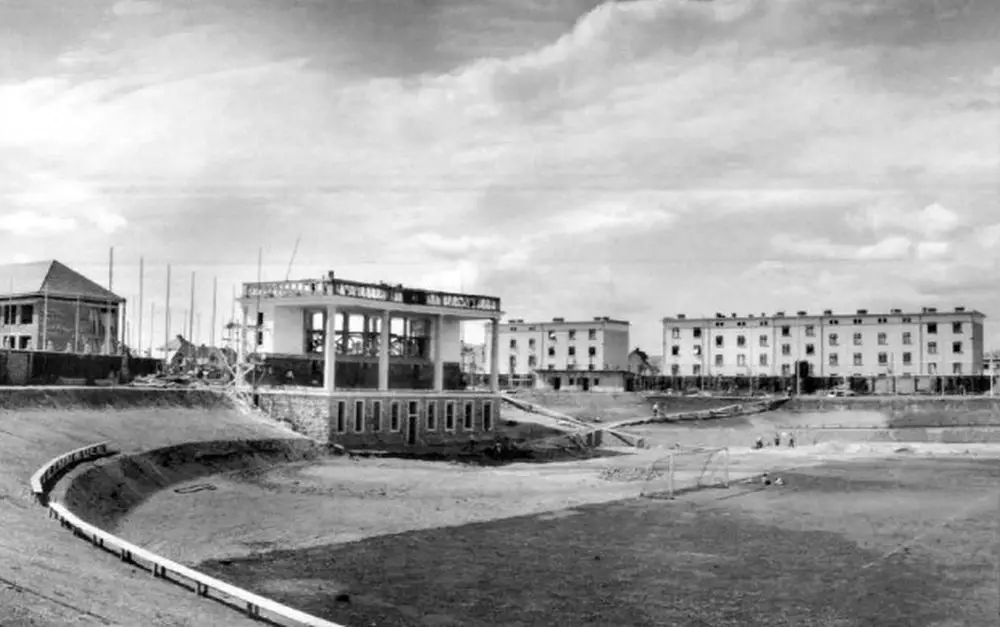
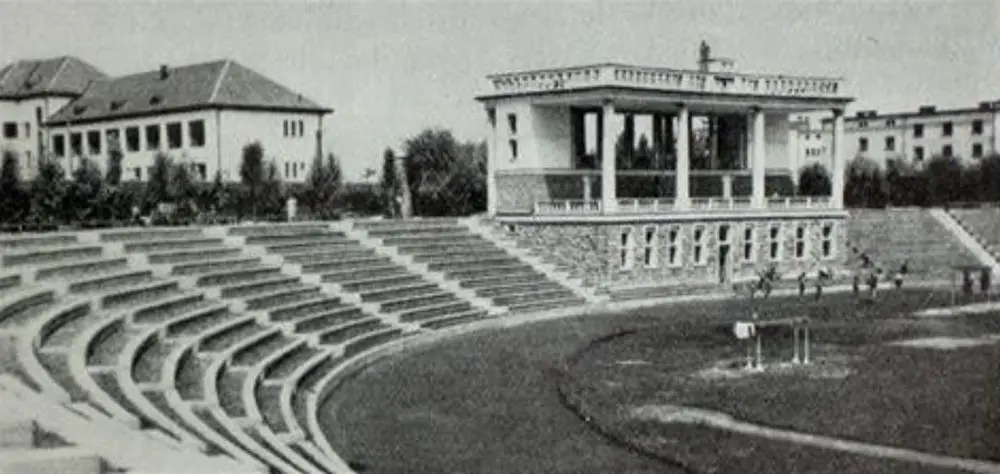
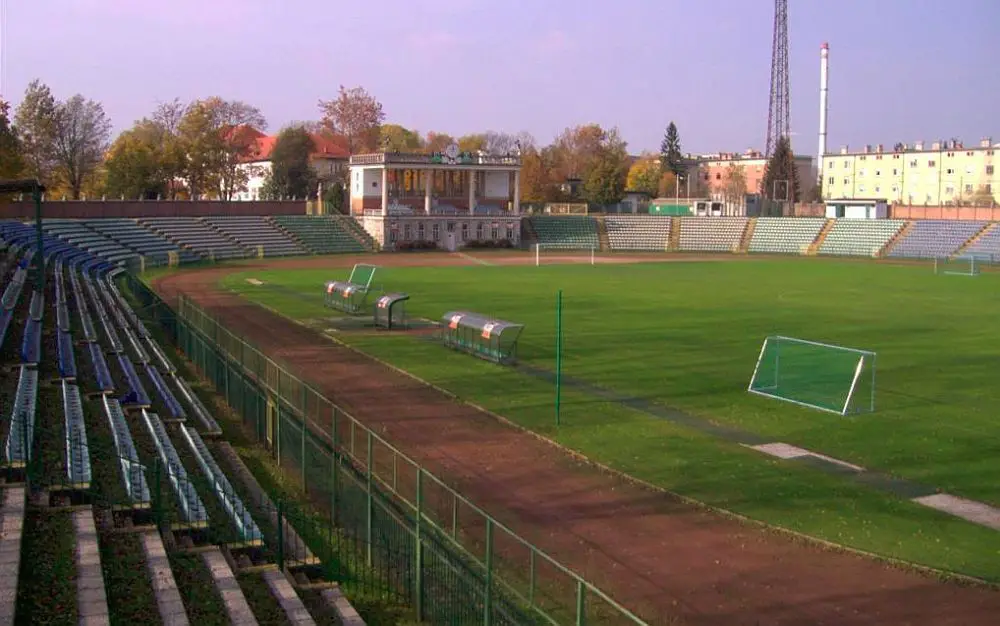
Moreover, in 2007 Ljubljana and Slovenia in general were suffering from the lack of a stadium that could host a major sports event and provide roofed tribunes for an adequate number of spectators. Providing the capital with such a venue was one of the 2006 local election campaign promises of Zoran Jankovič, Ljubljana Mayor since 2006.
In 2007 the city government of Ljubljana (MOL) found an interested investor for the reconstruction of Plečnik’s Stadium, a slot machine baron Joc Plečečnik, who also owned a gambling salon in Grosuplje and the Hotel Lev’s Casino until 2018, when they were sold to Austrian gambling giant Novomatic. According to Peter Rondaij’s open editorial for Dnevnik, Pečečnik’s interest in renovating the stadium was strongly related to his attempts at a Nevada (USA) non-restricted gambling licence, which would have been (and eventually was) granted to him on the condition of his general good track record that also involved a proof of active engagement in the field of culture.
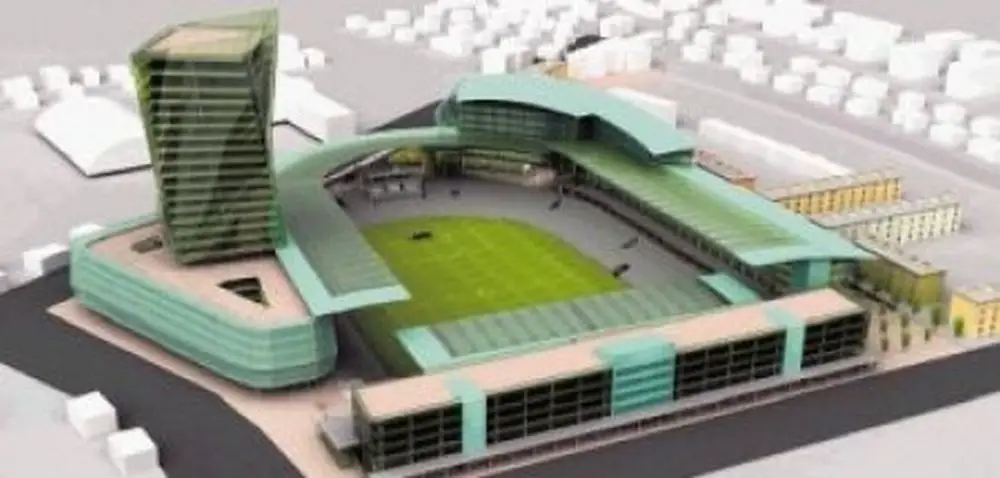

The winner of the public competition for the reconstruction of Plečnik’s Stadium 2009, designed by the German architectural studio GMP, was based on detailed urbanistic plans drawn-up by city Vice-Mayor Janez Koželj half a year later. The inspiration for the spatial planning seems to be heavily influenced by Pečečnik’s original plans for a skyscraper and a vast commercial area spreading deep underground. In the original plans five, not three, commercial buildings were intended by the northern wall of the stadium, currently hosting public gardens that have been in public use since the neighbourhood was built in the 1930s.
In October 2007, Bežigrad Sports Park Ltd. was established with the main shareholder being Pečečnik’s GSA (59%), the City Government of Ljubljana (28%) and Slovenian Olympic Committee (13%), the latter two contributing their shares in land. The property was immediately closed to the public using a construction fence and the project seemed to have proceeded without much need for either transparency or participation on the side of the public. Starting immediately after the fencing of the premises, citizens living nearby could only observe how the first thing to happen behind closed walls in December 2007 was the removal of floodlights and grass surface altogether, along with the drainage system. Part of a southern wall was demolished so that heavy trucks could get in and out. At the beginning of 2008, local residents also reported that all copper gutters and drain pipes has been removed from the gloriette, which was also reportedly deprived of its electric installations and then left with windows and doors open, which was done, according to speculation of the locals, to let vandals in so that they could destroy what the weather and time would not. According to Rondaij, this approach isn’t new. With “self-demolition” of protected buildings investors can clear a prime location for any development they want.
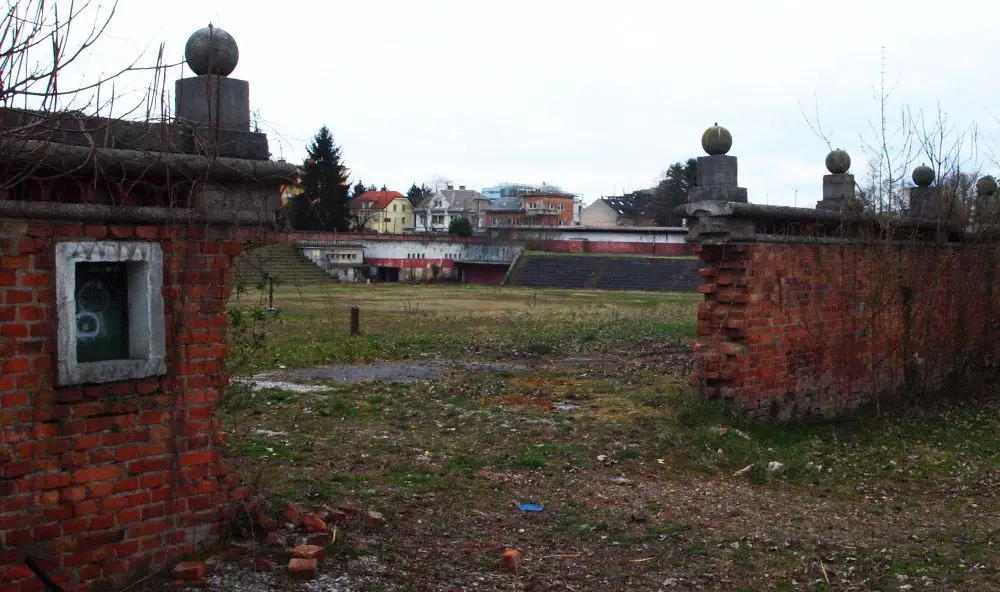
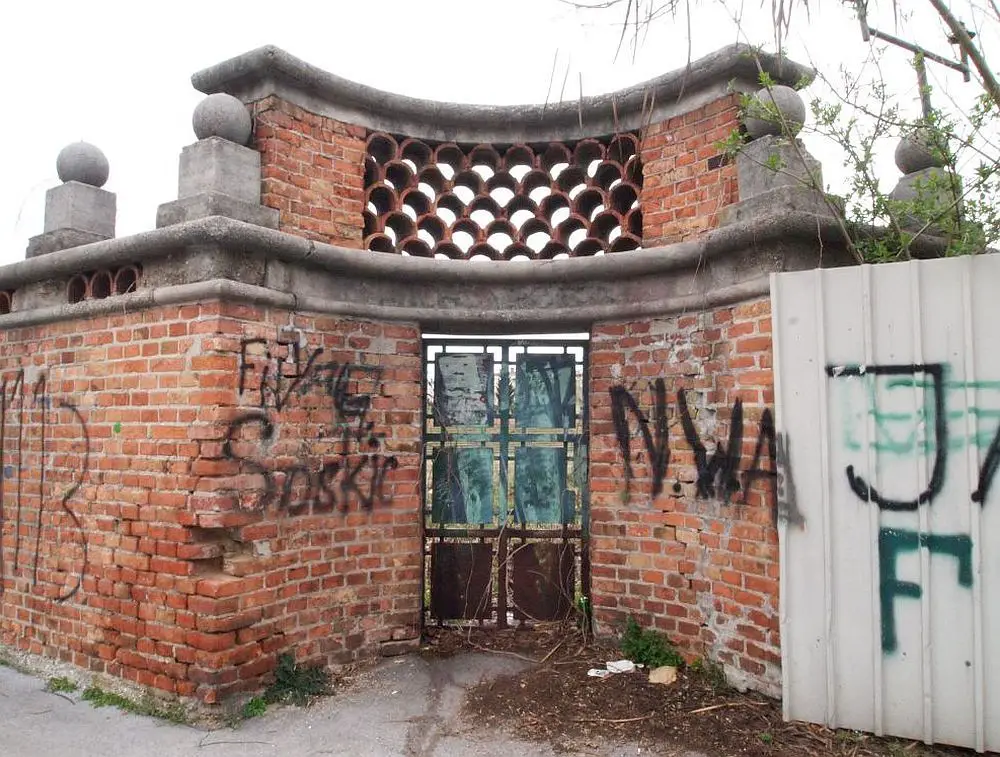
Meanwhile, in March 2008 an agreement was signed for another sports centre in a much more appropriate location for hosting masses of sports fans and concert goers. Right next to the highway ring-road of Ljubljana, a stadium and another roofed hall has already been completed and pretty much functional since 2010 in Stožice. With these facilities in place, the urgent need for a sports centre ceased to exist and the arguments for another such complex in the downtown area of a “green” capital that aims to replace dirty traffic with bicycle lanes and trees doesn’t seem to hold much water. Especially since this concrete moneymaking monster with several football field sized floors of parking lots is supposed to grow above and under a monument of protected cultural heritage.
The whole process seems to have taken a few shortcuts, one of them being the circumvention of the affected public, in particular the Fond community dwellers, who were left out of all discussions. In 2009 new spatial plans were shown to them which is how they learned that they would lose their gardens and views. The city government gave up the land as its 29% investment in Bežigrad Sports Centre Ltd. It was only from these plans, drawn up without alerting the general public, that one resident even found out that her house was set for demolition (source).
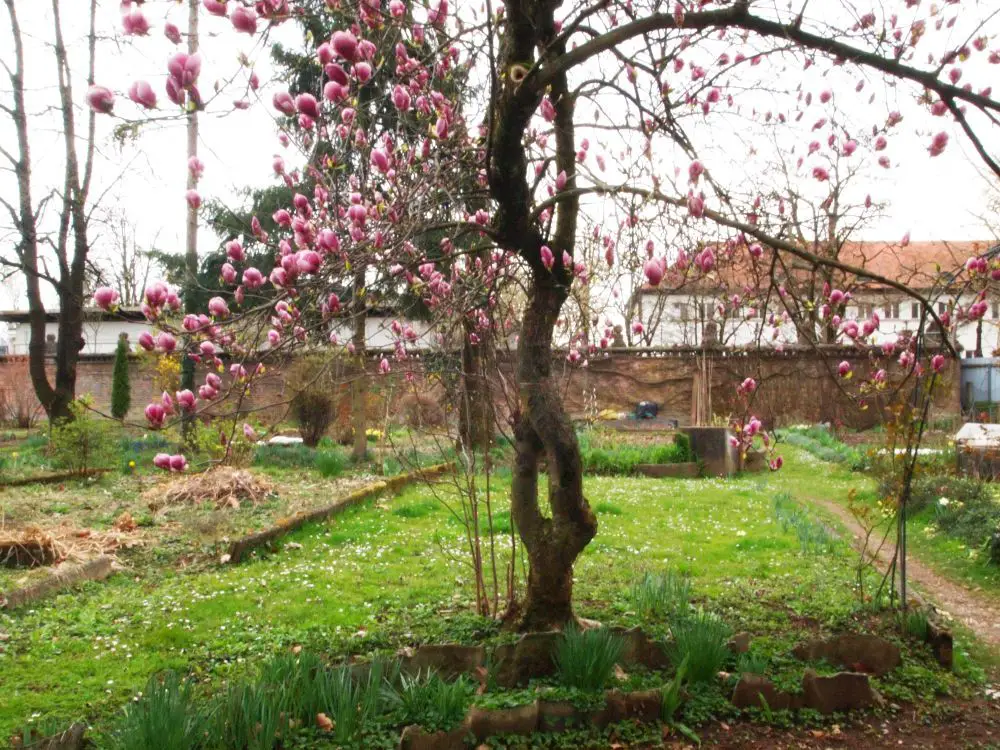
How a polarising project like this can continue to survive into the present is a mindboggling question. One of the explanations worth mentioning has been explored in detail in a graduation thesis, written by Danaja Visković Rojs. In short, the thesis contextualises the problem into the weak political culture of transitional societies, in which representatives lack the understanding of the nature of legitimacy of their governing jobs. Public participation in important decision-making processes, such as spatial planning, is a fundamental ingredient of democratic societies, something leaders of countries in transition to democracy find difficult to understand, instead taking their role of decision-makers as absolute. In return they lose the legitimacy of their political leadership, which they tend to compensate for with proofs of legality, exacerbating the conflict further.
In 2010 Zoran Jankovič, the Mayor of Ljubljana explained to Delo why the project continues to persis: while the city government contributed only land and wouldn’t lose anything by the contract ending, Joc Pečečnik invested money and would therefore lose €15 million if the project didn’t get through, which wouldn’t be fair to him. Which method of accounting brought Pečečnik to this number, Mayor Jankovič did not explain. The list of maintenance costs according to the official project’s website amounts to only €77,500. Yet the Mayor of Ljubljana seems to have a greater understanding for the interests of the city’s business partner, by now a “small king” of Las Vegas, rather than for the citizens who elected him.
Not surprisingly, in his interview for Delo Joc Pečečnik expressed great satisfaction with the city government’s collaboration, saying he has “no complaints” whatsoever. His take on Fond’s community protests, that are delaying the construction of the stadium, is simplistically legalistic with a neo-liberal newspeak definition of “public interest”: nobody has the right to interfere with his private property and it is the state’s duty to “protect the entrepreneur” and “allow him to create jobs and added value”. If someone out there wishes to use the stadium for “their own personal interest and (use it to) grow lettuce”, he has already offered to “buy his share for a very reasonable price”.
The city government and the Ministry of Culture told 24UR that they do not have the money to buy Pečečnik’s share. But do they even need to? They can simply leave the project and allow the lettuce continue to grow.
STA, 30 March 2019 - Damir Črnčec, the state secretary in the prime minister's office for national security, has told the Siol web portal that all types of radicalisms or extremisms are present in Slovenia, but noted that Slovenia is a safe country.
Črnčec, whose appointment as Marjan Šarec's aide has raised some controversy, said that "all three types of radicalisms and extremisms are present in Slovenia - the right and left, as well as Islamic fundamentalism."
While noting that Slovenia was a safe country, he said that the biggest potential threats were those of the information and cyber type and the issue of illegal migrations, terrorism and a rise of extremism and violent extremism.
Črnčec finds that terrorism is very well defined in the Slovenian legislation, "while there are legal voids when it comes to extremism and violent extremism."
He said that Slovenia lagged behind other countries in terms of information and cyber security, but added that the government had earmarked additional funds for this field in 2019.
"We count on an administration for information security to be established within the Public Administration Ministry, which would deal with the preventive aspect of the forming of a serious information security backbone in Slovenia."
According to Črnčec, the EU is under the "threat represented by so-called fake news and disinformation". "We are talking primarily about the influence of external players, countries, on the political process in the EU."
"The same is true for the influence of these players on individual countries," he said. Asked whether Russia represented the biggest threat in this respect, he said he could hardly say something like that when it came to Slovenia.
Črnčec insists that illegal migrations were primarily a security issue and that it was a criminal act, with the structure of illegal migrants representing the biggest risk.
He assured the public that the migration issue is being managed. "Maintaining a balance between security and solidarity is and will remain the key imperative of our actions in the future."
Commenting on the attempts of the local authorities in Ilirska Bistrica (SW) to prevent a migrant centre from being established there, Črnčec said that the government's position was that a local referendum on the issue was inappropriate.
There is no legal basis for it either, he said, adding that "the government will simply not allow that."
Regarding hate speech, of which he personally had been accused of in the past, Črnčec said that hate speech was present in Slovenia and that a challenge for the future remained to find a balance between its regulation and freedom of speech.
All our stories on Slovenian politics are here
STA, 29 March 2019 - Slovenia recorded a general government surplus of EUR 303m last year or 0.7% of the country's gross domestic product (GDP), the Statistics Office reported on Friday, the biggest surplus on record.
While Slovenia recorded a general government a surplus of EUR 5m or 0.01% of GDP in 2017, it significantly increased last year.
"This is the first time such a high surplus was recorded since such data have been monitored, i.e. since 1995," Nina Stražišar of the Statistics Office told the press in Ljubljana.
Expenditure continued to grow, but at a slower pace than revenue. Revenue rose by 1.178bn or 6.3% year-on-year while expenditure was up by 4.7% or EUR 881m.
Due to the favourable conditions on the labour market and economic growth, the state collected EUR 649m more in taxes than in 2017. Revenue from value added tax (VAT) was up by 8.1%, while revenue from income and property taxes rose by 10.2%.
Revenue from taxes and social security contributions increased by 7%, while the good performance of companies in which the country holds ownership stakes resulted in a 21% rise in non-tax revenue from dividends.
On the other hand, expenditure for gross investments in fixed assets surged by 24.9% and for subsidies by 8.6%. Expenditure for intermediate consumption increased by 7% and spending for welfare payments by 3.5%.
This implies there was an acceleration in the drawing of EU funds in the second half of 2018, Stražišar said.
The state meanwhile reduced interest expenditure by 15% due to refinancing of outstanding debt with new bonds with lower yields and repurchase of a portion of bonds denominated in US dollars.
Interest expenditure excluded, the growth of expenditure would be 6% and general government surplus would amount to EUR 1.2bn or 2.6% of GDP.
The Finance Ministry has projected that general government surplus will slightly increase this year, to 0.8% of GDP.
Consolidated general government debt amounted to EUR 32.23bn or 70.1% of GDP, which is 3.9 percentage points down compared to 2017.
Contributing the most to the reduction of debt was the nominal growth of GDP. In nominal terms, general government debt increased by EUR 371m or 1.2%.
More detailed data can be found here
Mladina: Who is opposed to changing the system of supplementary health insurance, and why?
STA, 29 March 2019 - The left-wing weekly Mladina looks into the reasons for the opposition to the idea to abolish supplementary health insurance in its latest commentary, noting that it is more than 15 years old, much older than the Left, which usually gets credit for the idea.
"The people who are screaming about excessive public spending are also screaming about the Left (and the coalition) wanting to take EUR 500m away from healthcare by forcing the idea," editor-in-chief Grega Repovž says in Crazy World.
"The idea to abolish supplementary health insurance is much older than the Left. It is more than 15 years old. It has been present since it was revealed that some lobbies are using it to literally cut away a part of public money they collect instead of the state."
According to Repovž, these lobbies are turning this money around on financial markets, take their 10% and then return it to the state. "This would have been abolished everywhere long ago. But not in Slovenia. Let's see why this is. Because the reasons are actually very banal, shallow and evil."
The coalition is not actually proposing abolition of supplementary health insurance, but its merging with compulsory insurance. The catch is that people with lower income would pay less, up to 20 euros a month, and those with higher income would pay more, up to 70 euros.
A majority of the decision-making MPs, officials, directors - the entire upper class, would pay more, and the thing is that they do not want to pay more. They instead let three private insurers to get their EUR 60m every year from the people.
In short, the entire upper class is pretending ignorance and does not want to shoulder its share of costs for healthcare, the share proportionate to their income. This is why they are willing to lie that the coalition (and the Left) wants to take EUR 500m away from the healthcare sector.
"Well, the question is on whose side the new health minister is. He has not been convincing so far, but he belongs to the party of the prime minister, who has committed to implementing this objective in the agreement with the Left."
It is very easy to explain the reasons for abolition of supplementary health insurance to the public, for example with the situation of general practitioners, concludes the commentary.
Demokracija: Fidesz helps EPP ahead of EU election
STA, 28 March 2019 - The right-wing weekly Demokracija says in its latest commentary that the European People's Party (EPP) members made the right decision in not expelling the party of Hungarian Prime Minister Viktor Orban and thereby diminishing EPP leader Manfred Weber's chances of becoming the next president of the European Commission.
Last week, Weber faced the serious threat of a discord in the EPP right ahead of the EU elections, and a possible break-up of the group was not excluded either, as some parties had announced they would leave the EPP if Fidesz was expelled or forcedly suspended.
At first, it seemed that a majority of the EPP members were leaning towards such a proposal from 13 members, as this was supposed to be the key to success of Christian democrats in the May elections, editor-in-chief Jože Biščak says in EPP's Training Day in Brussels.
But after the speech by Janez Janša, the head of the Slovenian Democratic Party (SDS), who seriously warned that such a decision could cause irreparable damage, the scales tipped to the other side and Orban's proposal for a six-month suspension was accepted.
A continuation of the dispute would mostly benefit the political groups on the left, as socialist Frans Timmermans would easily beat Weber, Biščak says, noting that the solution was temporary, as everybody is waiting for the election result.
The compromise between the EPP and Fidesz is the best solution for European conservatives at the moment, as they remain (at least seemingly) unified, and one can say that Orban did a favour to Weber.
As projections suggest, Orban will be a great winner of the EU elections in Hungary, and Weber's chances of becoming the next president of the European Commission would have dropped drastically had Fidesz left the EPP, as it would be followed by more parties. Actually, it would be mission impossible, concludes the commentary.
All our posts in this series can be found here
Our earlier stories on this case can be found here
STA, 29 March 2019 - Andrej Šiško, the self-styled leader of a militia called the Štajerska Guard, has been sentenced to eight months in prison for trying to subvert the constitutional order. Matej Lesjak, charged with aiding Šiško, received a three-month suspended sentence. The ruling is not final yet.
The sentence was handed down by the Maribor District Court on Friday after a trial that lasted only five weeks on the first ever charges brought for the crime of inciting to a violent subversion of the constitutional order.
Judge Vanja Verdel Kokol ordered that the 49-year-old Šiško be released from custody today after more than six months in detention. The time he has spent in detention will count as part of the sentence.
According to the judge, Šiško attempted to subvert the constitutional order with various moves, including by threatening the then Prime Minister Miro Cerar in January 2017 and founding the Štajerska Land and then a para-military unit, the Štajerska Guard, in September 2018.
Verdel Kokol said Šiško had gone too far and that history thought us that such actions must not be underestimated.
She noted that the defendants started claiming the whole thing was but a provocation only after criminal procedure had been filed against them.
"A democratic society should not be taken for granted and it can be jeopardised. This is why clear boundaries must be set to prevent undermining its foundations."
Šiško, the leader of the non-parliamentary United Slovenia Movement, and Lesjak, a former member of the opposition Democratic Party's (SDS) youth wing were apprehended in September after a video was posted on social media of a para-military group parading with airsoft rifles in the woods in north-east Slovenia.
While Šiško is considered to have organised the exercise, Lesjak is believed to have filmed it and posted the video on the internet.
Both claimed the campaign was but a provocation designed to bring to the public's attention the problematic workings of Slovenia's politics, mass media and security system.
Bot the judge dismissed this, wondering why Šiško had gathered information about the militia members' blood type if it was all a joke.
The state has a monopoly over national security and there is no space for para-military groups. "Incitement to a violent subversion of the constitutional order may encroach on the fundamental rights of Slovenian citizens," she said.
According to the judge, the intention of the exercise was to spread ideas propagated by Šiško in order to attract more followers angry with the current government.
It is therefore unimportant whether they carried real weapons; even display of weapons similar to real weapons achieved its purpose, the judge said.
Šiško, reacting in his signature fashion, said the ruling confirmed that Štajerska had been established as an independent land. He now expects a meeting with the prime minister and home minister to set down the details of his militia's cooperation with the police and the army.
He also rejected the notion that he incited to violence, "but what others understand is another thing altogether. I speak Slovenian, but obviously the prosecutor and the judge have trouble understanding."
The prosecutor had proposed that Šiško spent 16 months in prison - the maximum sentence would be five years - but was nevertheless satisfied with the sentence. The defence said the ruling was expected.
Šiško's lawyer, Lucija Šikovec Ušaj, framed the trial in free speech terms, arguing that Slovenia will have to come clear once and for all about whether people have the right to free speech.
"If they say we don't, we'll have to stick to it. Such dictatorships do not last long, though. It is true, however, that Europe is gravitating towards limiting free speech and the judge has joined this bandwagon," she said.
The five-week trial saw a fair share of unusual scenes, from Šiško spending days delivering his defence to his supporters at one point appearing in front of the Maribor Courthouse with a white stretch limo to salute their leader.
Šiško, the leader of the far-right party United Slovenia, has long been active politically and he even ran for Maribor mayor from detention in the November 2018 local elections, securing 1.43% of the vote.
He has also announced his intention to stand in the May elections to the European Parliament, while his lawyer Šikovec Ušaj is among the founding supporters of a new far-right party, the Homeland League, which plans to field her in the EU election.





